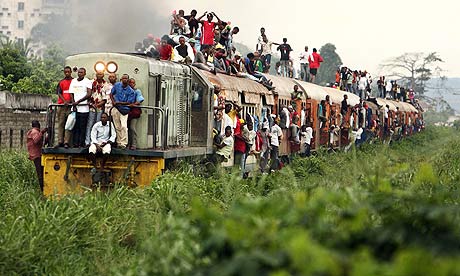Transport Infrastructure to promote health development
In Africa, transport infrastructure is playing a big role in promoting health development to achieve the Millennium Development Goals. These millennium development goals states that by 2015 Child Mortality should be reduced (MDG 4), Maternal Health should be improved (MDG 5) and Combat major diseases (MDG 6). Although it is like that, most developing countries are facing a lot of challenges as they try to improve the transport infrastructure and mobility in order to improve access to health services. I believe that they still can improve the health agenda.
First of all, the governments in the developing countries should have confidence in rural areas. Transport infrastructure is the key to development; therefore the governments should try everything they can to bring roads, railway lines and some other transport facilities to the rural areas (villages). This will unlock the rural areas and they will have access to good medical care. Most of the people in the rural areas fail to access the good medical care because of lack of transport infrastructure. Most good hospitals are located in the areas which need good roads to be accessible. Therefore, if the government can bring the transport infrastructure to the villages, the people from rural areas will be able to go to hospitals without any difficulty; the pregnant women will be accessing medical care in good time and they will not be dying of treatable diseases. At the end, we will have disease free nations; with strong and energetic people who will work day and night for the economic development of African countries.
In addition, there is a need of private public partnership in developing countries of Africa. In this program, the government will be giving the private individuals a chance to provide developments. The private individuals can be able to construct their own roads and charge a cost to the people who will use them without any restriction from the government. This will motivate the people to build more roads and railway lines even in the rural areas for business. These roads will provide a way to the areas which are not accessible. Right now it is very hard for an individual in developing countries to build a road. The government can arrest that person because a road is a public good and it is only supposed to be controlled by the government. This is bad because it does not give a chance to the other individuals to develop their areas. Therefore, if the developing countries can promote public private partnership, then the people from the rural areas will have an access to good hospitals which are not easily accessible, because of distance and lack of roads. Doctors will also be willing to stay in villages because they can use their cars without any problem.
Transport Infrastructure to promote health development
The governments of the developing nations should also come together and gather some money for the construction of good schools for training the people who manually construct roads, railway lines and other transport infrastructure. This will help because it is expensive to study from abroad; therefore if they can have their own schools, then they will not be spending a lot of money sending their people abroad to acquire education on how to construct rail way lines and long lasting roads. The products of this school can be constructing roads and other transport facilities in rural areas at a low cost. Then the developing nations will not be spending a lot of money bringing people from abroad to construct the roads in Africa. They will be doing it on their own and save the money for other developments. The developing countries should use the regional integration like “Southern African Development Community (SADC), Economic Community for West African States (ECOWAS)” and other regional organizations for implementation of this and it will work. At the end the people from the villages will have an access to medical care. Ambulances will be able to reach the rural areas and the people will be having an access to visit the hospitals where they can receive the proper treatment.
In conclusion, transport infrastructure in developing countries can improve the access to health services. Donors, the government and the individuals should be committed and developing nations will be developed in terms of transport infrastructure and the health services will be accessed without problems. At the end, these developing countries will achieve the Milleniumn Development goals 4, 5 and 6. This is a step in the right direction.
Peter Yakobe can be reached on peteryakobe@yahoo.com


